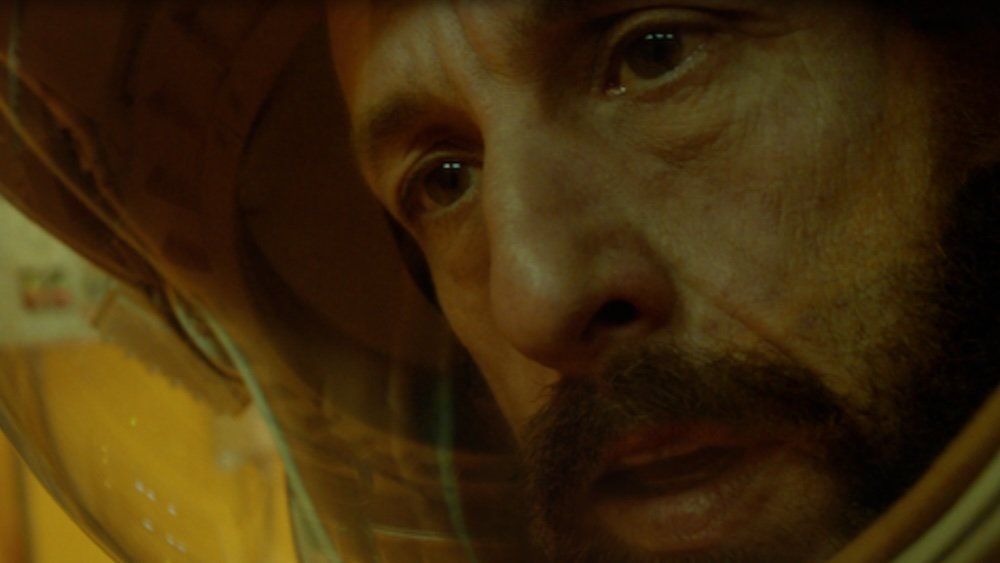“Spaceman” - Film Review
This review was originally posted on Film Obsessive.
“I heard you’re the loneliest man in the world,” a young child says to Jakub (Adam Sandler) of Spaceman. In a way, the child is right. Jakub is the farthest from Earth a human being has ever been. He’s on a solitary mission to the outer edge of the galaxy to investigate the Chopra Cloud, a strange formation that has captured the attention of people on Earth. What exactly they fear or hope to gain from Jakub’s journey to study the cloud is never explained, but it’s of the utmost importance to Commissioner Tuma (Isabella Rossellini) of Czechoslovakia’s space program. Spaceman is a retro, revisionist take on a space race that never was, and its head is a little too lost in space to bring the film home.
There are two relationships at the center of Spaceman. The first is between Jakub and his wife, Lenka (Carey Mulligan), who is on Earth. It’s unclear when their relationship first showed signs of fracturing, but when we meet these two, 189 days into Jakub’s journey, it seems their relationship has passed the point of no return. The other central relationship is between Jakub and the extraterrestrial spider that Jakub eventually names Hanuš (Paul Dano). At first, it’s impossible to know if Hanuš is real or the result of Jakub’s prolonged isolation. Hanuš wants to learn about Jakub and asks question after question about his wellbeing. As the spaceship inches closer and closer to the Chopra Cloud, Jakub begins to open up to the strange spider.
Courtesy of Netflix
Spaceman is a strange little flick. It’s at odds with Sandler’s more recent fare, but it’s his performance that effortlessly pulls the audience into this space oddity. He’s quiet, lonely, and terrified to make sense of his emotions. It’s only through constant prodding from Hanuš that Jakub begins to reflect on the life he left behind. It also helps that Dano’s soothing, monotone voiceover work as Hanuš feels like a lullaby of sorts. There’s a melodic nature to his cadence and the six soulful eyes of the spider make Hanuš seem like a loving, but strange, household pet. The dynamic between Hanuš and Jakub as the spider tries to understand the inherent flaws of humanity is the film’s greatest strength.
Mulligan, as always, is stunning. It seems to be impossible for her to turn in a subpar performance, but in the case of Spaceman, she’s been dealt a rough hand of cards. The issue is that Lenka, as a character, is hollow. She’s the quintessential example of a sidelined wife. The audience sees her in the present day, trying to figure out where her life goes from here as a pregnant woman without her partner. We also see glimpses of her in the past, in the beginning of her relationship with Jakub when things were beautiful. Who Lenka is as a human being is never examined. We don’t know what she likes, what her hobbies are, or anything that gives her a sense of personality. It’s almost easy to overlook how underwritten Lenka is because of Mulligan’s strength as a performer. She imbues a sense of depth and believability in every movie she acts in, but that shouldn’t replace explicit character development.
Courtesy of Netflix
Spaceman is mesmerizing. When the story is focused on Jakub in space, the camera doesn’t have to adhere to any sense of gravity. The camera, the viewer, Jakub, and Hanuš float weightlessly together, tumbling, turning, and spinning gently through the spacecraft. Behind the camera is Johan Renck, who is perhaps best known for Chernobyl. The two works share a sense of melancholia and the connective tissue of humanity’s grief. At times, Spaceman comes close to the highs of Chernobyl. Perhaps it’s personal preference, but there is something interesting about examining human nature through the (six) eyes of an entity that is extraterrestrial. Humans self-sabotage and inflict loneliness on ourselves because our brains have tricked us into believing that isolation will make things hurt less. Of course, that’s never the case.
There will be many who walk out of Spaceman feeling like the film poses a multitude of questions that it doesn’t bother to answer, and they will be right. It’s understandable that this decision will cause frustration, and there are some questions that do not need to be answered. Spaceman doesn’t have to fully explain why the Chopra Cloud matters so much or how exactly Hanuš found his way onto the spacecraft. Those things don’t matter because Spaceman is about the humanness of it all. The problem is that the developments between Jakub, Lenka, and Hanuš all happen far too quickly to create an emotional punch to the gut of the viewer. Had Spaceman rooted itself a little deeper into the soul of humanity, it would have been out of this world.
Follow me on BlueSky, Instagram, Letterboxd, & YouTube. Check out Movies with My Dad, a new podcast recorded on the car ride home from the movies.


